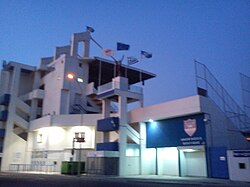Anorthosis
 |
|
| Full name | Anorthosis Famagusta FC Ανόρθωσις Αμμοχώστου |
|---|---|
| Nickname(s) |
Μεγάλη Κυρία (The Great Lady) Οι Κυανόλευκοι (The Blue White) |
| Short name | ANO |
| Founded | 30 January 1911 |
| Ground |
Antonis Papadopoulos, Larnaca |
| Capacity | 10,230 |
| Manager | Ronny Levy |
| League | Cypriot First Division |
| 2016–17 | First Division, 6th |
| Website | Club home page |
| Active departments of Anorthosis | ||
|---|---|---|
 |
 |
 |
| Football | Futsal | Volleyball |
 |
||
| Volleyball (women) | ||

The east side of the stadium at evening
|
|
| Full name | Στάδιο Αντώνης Παπαδόπουλος |
|---|---|
| Location | Larnaca, Cyprus |
| Owner | Anorthosis Famagusta |
| Operator | Anorthosis Famagusta |
| Capacity | 10,230 (full seated) |
| Surface | Grass |
| Scoreboard | Yes |
| Construction | |
| Built | 1983–1986 |
| Opened | 1986 |
| Renovated | 1997, 2006, 2007, 2008, 2012 |
| Expanded | 1997 |
Αnorthosis Famagusta FC (Greek: Ανόρθωσις Αμμοχώστου, Anorthosis Ammochostou), known as Anorthosis, is a Cypriot football, futsal and volleyball club. Originally based in Famagusta, the club is now based in Larnaca, due to the Cyprus dispute.
Anorthosis was founded in 1911 in Famagusta and in 1934 became one of the founder clubs of the Cyprus Football Association. Their home ground is the Antonis Papadopoulos Stadium, the president of the club is Antreas Panteli and the coach is Ronny Levy.
One of the most successful clubs in Cypriot football, Anorthosis has won 13 First Division titles, 10 Cypriot Cups and seven Super Cups. Anorthosis is one of three Cypriot clubs never to have played in the second division and the first one which had participated in the Champions League Group Stages.
The club was founded in Famagusta on 30 January 1911. After the 1974 Cypriot coup d'état and subsequent Turkish invasion of Cyprus, Anorthosis was relocated to Antonis Papadopoulos Stadium of Larnaca. Anorthosis' former home stadium in Famagusta, G.S.E. (Gymnastic Club Evagoras), has been abandoned since 1974 and is in poor condition.
Ammochostos, or better Varoshi, around 1910 was a small town of about 4,000 inhabitants: farmers, fishermen and a few shop-keepers. The only place of recreation was the coffee shop. At that time a few, spirited and enthusiastic men of that community set a goal and managed to create a "reading club" in hospitable rooms where they could gather and educate the youth in cultural and national matters.
...
Wikipedia
